A Killing in Comics (25 page)
Read A Killing in Comics Online
Authors: Max Allan Collins
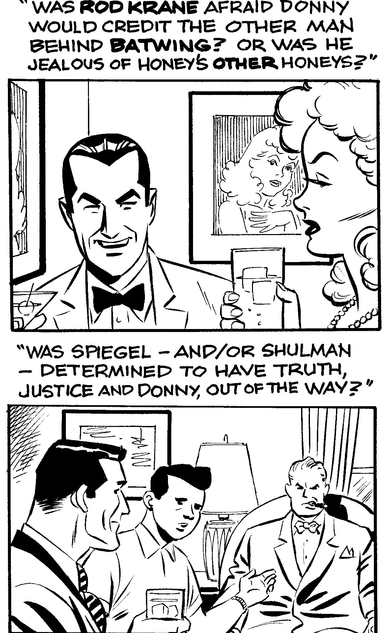
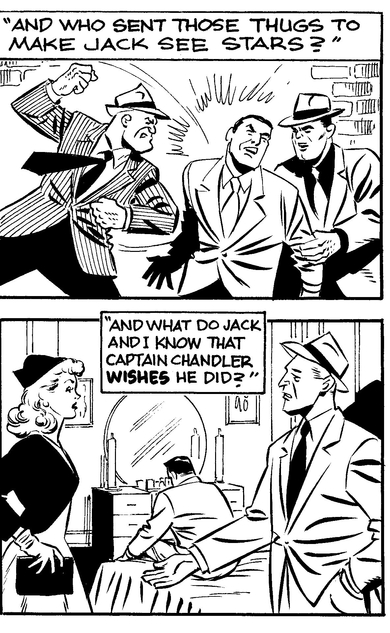
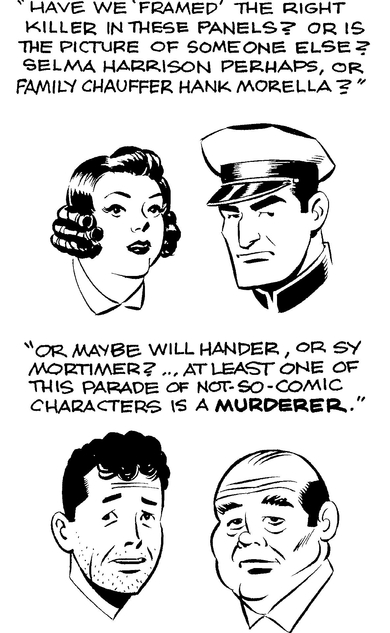
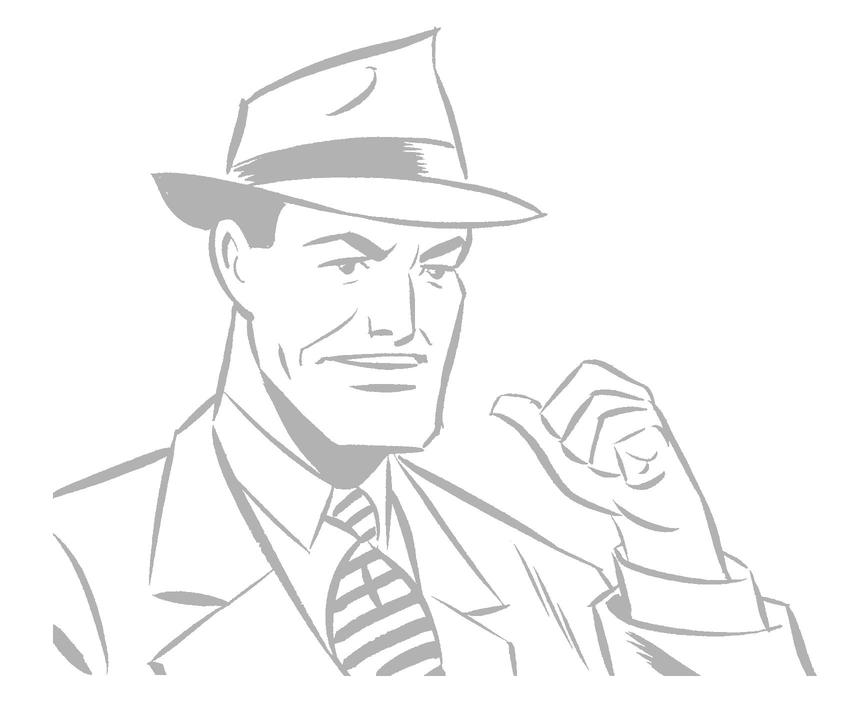
CHAPTER ELEVEN THE KILLER’S SECRET IDENTITY IS...
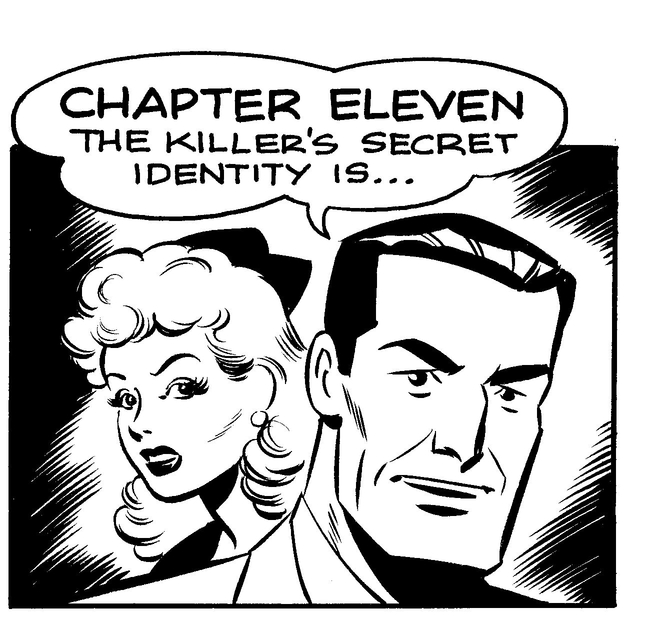
Business at the Strip Joint on Mondays was almost always slow, and Maggie and Felix, the manager, had been kicking around staying open Sundays instead. So it was no great sacrifice for Maggie to close the restaurant for a private party, though I’m sure the guests were startled to find the restaurant empty but for a handful of waiters and waitresses.
The group had been invited, each by a personal phone call from Maggie Sunday evening, to attend a business dinner Monday night, which would be on the Starr Syndicate’s tab. She had invited nine, and only one—attorney Bert Zelman—had a conflict that couldn’t be broken. That was okay, because he wasn’t really a suspect.
Not that the other guests had any idea that they were attending as suspects—all the invitees had at least a tenuous tie to the Starr Syndicate, enough to make a business dinner invite like this one credible.
Three smaller tables had been arranged into one long one, fairly close to the wall on which numerous comic strip characters had been drawn (and colored) in grease pencils. This particular stretch of the wall was mostly Starr Syndicate properties, and was no doubt why Maggie had instructed the Strip staff to set the banquet-style seating up here, so that Wonder Guy (a large drawing in full flight) and Batwing (a crude but recognizable sketch actually drawn by Krane himself) would loom over us.
I say us, but I was not at the table. I sat on a stool at the end of the bar, just a trifle kitty-corner from the table, though well in earshot. Next to me sat chauffeur Hank Morella, who Maggie had invited inside rather than have him wait at the curb for Selma Harrison.
Hank was back in his chauffeur livery, gray, not green this time, with the cap on the bar; he was having a beer and I was having a Coke on ice. Or a rum and Coke, no rum, as I’d described it to Honey Daily, what seemed a thousand years ago and was only four days.
Everybody was drinking, the Strip Joint barmaids (in their white shirts, black bow ties and tuxedo pants) keeping everyone’s glass full. No actual food, not even a snack had been served, and the guests looked like they might any time start eating the red-cloth rose arrangements in two good-size centerpieces. The distinctive and decidedly pleasant aromas of the restaurant’s kitchen provided convincing evidence that food would, eventually, be served.
On the far side of the table—with Wonder Guy and Batwing drawings looking over their shoulders—were, left to right: Will Hander, in a brown suit with a brown-and-yellow tie, shaved, not looking like a guy who lived in a flophouse, rye whiskey, no rocks; Sy Mortimer, in an off-the-rack blue suit with a red bow tie, beer; Louie Cohn, in a black suit with a black bow tie, looking like he couldn’t decide whether he wanted to be a maitre d’ or an undertaker when he grew up, gin fizz; and Selma Harrison, in a black-and-white print dress with a white collar, like she was gradually moving out of mourning, Chablis.
The three on the other side—Harry Spiegel and Moe Shulman, in off-the-rack brown suits, drinking beer, and Rod Krane, again with the white dinner jacket, martini—would’ve had their backs to me, but I had profile views: their chairs were angled to face the head of the table, the end closest to me, where Maggie right now was standing to address the group.
She was in full battle array now, all right. Her makeup stopped short of being more appropriate for the stage than real life, her green eyes longer-lashed than God intended, her freckles hiding under face powder, her lips a scarlet red, with a beauty mark on her right cheek that also wasn’t the Almighty’s idea.
Her dress was striking, a Maggy Rouff design from her most recent London trip—pale smoke-gray crepe with pushed-up sleeves and a double-pointed peblum with a darker gray big-buckled belt. She wore black gloves that went halfway to her elbows, like something D’Artagnan misplaced. Her red hair was full and to her shoulders (a wig but a damn fine one), no hat, with a small jeweled broach depicting her trademark red roses. Definitely at her fighting weight, she looked elegant and sexy and—despite the friendly smiles and warm comments she was tossing like a flower girl dispensing petals at a wedding—dangerous.
Maggie was drinking, too, of course—a Horse’s Neck. Or that’s what she would be drinking, if she ever got around to it. I noticed the glass had not yet touched her lips.
No need for her to ping a water glass to get attention—once she’d risen in her full glory the guests turned to her, hushed. They were smiling. She was, after all, a celebrity, and being in her presence felt special.
Tonight it should feel particularly special.
As she stood beaming out over grateful subjects, as if they were a particularly responsive first-night audience, she said, “First I want to thank you all for coming at such short notice. But I must admit I’ve gathered you together on something of a false pretense . . .”
Guests exchanged glances; then murmuring was halted by her raised black-gloved palm.
“. . . but you needn’t worry. You will be rewarded with the finest strip steak in New York, and at the expense of the Starr Syndicate, in gratitude for your presence, and your continued efforts on the behalf of the comics business.”
A leering Rod Krane said, “You’re not trying to get me liquored up again, are you, Maggie?”
“No. I find you rarely need encouragement, Rod.”
This got an appreciative laugh from most of the group, though you had the feeling Will Hander, staring blankly at his
Batwing
co-creator, didn’t find anything about Rod Krane all that amusing.
Batwing
co-creator, didn’t find anything about Rod Krane all that amusing.
Harry Spiegel, fidgeting like a kid in the backseat on a car trip waiting for the next bathroom stop, almost shouted, “Freelancers like us don’t mind a free meal, Maggie—but what’s this about, anyway?”
Her smile remained but had lessened its voltage; her eyes traveled from face to face. “Some of you . . . certainly
one
of you . . . have already guessed. The business of this meeting is not comics. It’s murder.”
one
of you . . . have already guessed. The business of this meeting is not comics. It’s murder.”
A symphony of chair squeaks and clothing rustle and whispers followed, and she raised high a hand that might have been in benediction, but wasn’t.
“You’ve all seen the papers,” she said. “It’s taken till today, but the coverage has finally gotten brutal. Another murder will do that, particularly when . . . meaning no disrespect, Selma, not wanting you to be uncomfortable, dear . . . when the second victim was the mistress of the first victim.”
Indeed the headlines today had screamed (except for the
Times
, which merely insisted) that
Wonder Guy
publisher Donny Harrison’s death by poisoning had been confirmed by “officials” as a murder; and that the strangulation slaying of Honey Daily, Harrison’s “kept woman,” was believed by the police to be related.
Times
, which merely insisted) that
Wonder Guy
publisher Donny Harrison’s death by poisoning had been confirmed by “officials” as a murder; and that the strangulation slaying of Honey Daily, Harrison’s “kept woman,” was believed by the police to be related.
The papers had nothing about any significant developments in the case (or cases), but that wasn’t bad reporting, simply Captain Chandler and the rest of the Homicide Bureau not getting anywhere. I had spent three hours back in Chandler’s office, tearing the heart out of a lovely Sunday afternoon, telling him everything I knew, including who I suspected.
And Chandler had agreed with my (and Maggie’s) conclusions, but did not have enough physical evidence to support taking the theory to the district attorney.
At the head of the table, my tall lovely stepmother hovered over her guests and now no trace of smile remained; her arms were folded, and she might well have been the bailiff in a courtroom, or at least in a courtroom in a Minsky’s sketch.
“From the start,” she said, “Donny’s murder seemed directly related to the comic-book business—he even died wearing a Wonder Guy costume. . . . By the by, Selma, how many of those did Donny have?”
Startled, the plump, pretty widow said, “Why . . . just the one. He had a few Wonder Guy T-shirts he would wear . . . he liked to unbutton his shirt at parties and say, ‘This looks like work for Wonder Guy!’”
A real cutup, our Donny.
“But,” Selma was saying, “he just had that one special costume that he wore at events like conventions and big sales meetings and, you know, things.”
“Of course,” Maggie said, not unkindly, “you had a reason for resenting your husband that really had nothing to do with comics. He was unfaithful and . . . excuse me . . . he did flaunt that unfaithfulness in a way few wives would put up with.”
Selma, flushed with irritation, said, “That’s nonsense!”
“I don’t think so,” Maggie said. “It was a slap in your face, your husband having that party at Miss Daily’s suite.”
Louie Cohn was starting to rise. “You don’t have to listen to this tommyrot, Selma. We were indeed lured here under false pretenses . . .”
Krane was on his feet, too. “I agree with Louie. I like a free steak as much as the next starving artist; but, Maggie, you go too far!”
Even mild Moe Shulman, though he hadn’t risen, was objecting. “Miss Starr, you say Mrs. Harrison had a ‘reason for resenting’ her husband . . . but what you
mean
is, she had a motive.”
mean
is, she had a motive.”
Other books
The Complete Drive-In by Lansdale, Joe R.
~cov0001.jpg by Lisa Kleypas
Z-Burbia 4: Cannibal Road by Jake Bible
To Burn by Dain, Claudia
A Mutiny in Time by James Dashner
Nothing Gold Can Stay by Ron Rash
The Time Capsule by Lurlene McDaniel
Scorched Eggs by Laura Childs
The Texan by Bobbi Smith
El Escriba del Faraón by César Vidal